Introduction
Modern world:
- High speed;
- Busy schedules;
- Changing gender composition in the workforce;
- Women pursuing careers.
Result:
- The growing need for before and after school care for children of all ages.
Solution:
- Workplace sponsored child care facilities providing care for infants, toddlers, preschool and school-aged children.
Outcomes:
- Parents in control of their careers;
- Harmonious development and professional care for children.
Today we live in the era of high speeds and very busy schedules. In the contemporary world the gender composition of workforce is gradually changing as more and more women start to pursue careers in male-dominated areas such as politics, business, and economics among others. When both parents are constantly occupied at work someone needs to keep an eye on the children. Besides, in many families the working days of parents are longer than school days of children. As a result, the need for before and after school care grows.
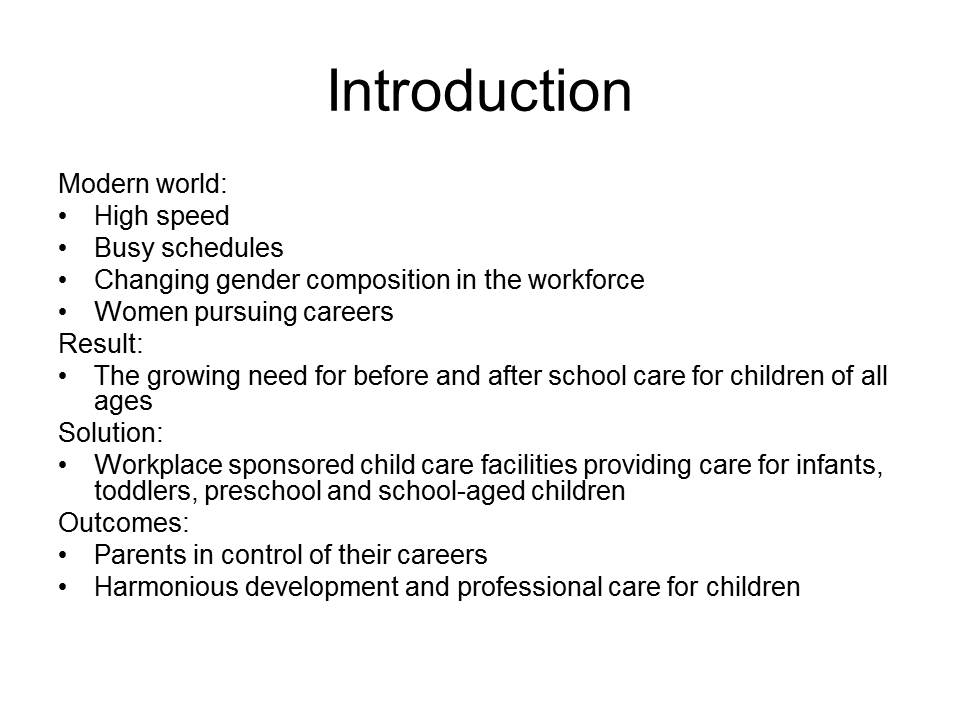
Quality Care and Learning Experiences
Successful before and after school care and learning experience:
- It is not school and needs to be a different experience;
- It has to be fun and play-based;
- Must be versatile and engaging;
- Also has to incorporate time for homework;
- Needs to inspire children to communicate and collaborate with each other;
- Is to provide challenging experiences to facilitate growth;
- Cooperation with families of children;
- Its holistic approach needs to successfully integrate a number of learning theories to provide extracurricular education.
In order to provide before and after school care of good quality the educators need to combine a number of teaching approaches and methods which help to deliver care that is not perceived by the learners as more school time, but is fun. Besides, since children are energetic and need physical activities for the harmonious development, after school care has to be mainly play and game-based.
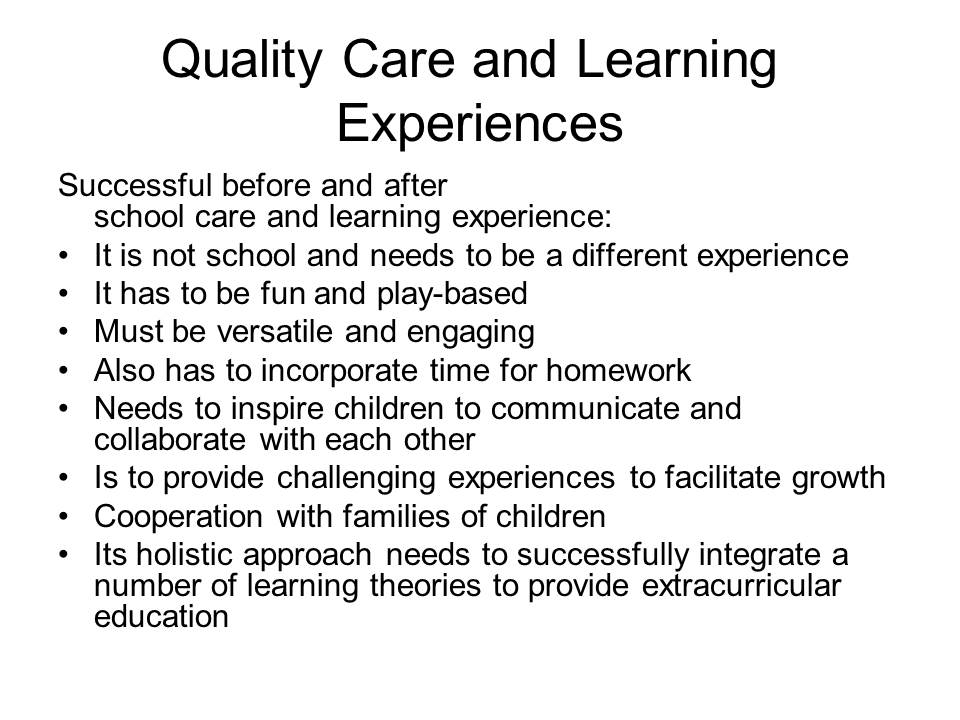
Learning Theories
Learning theory is an approach towards teaching based on different ways of explaining how information is acquired, memorized and processed by the learners.
Learning theories:
- Behaviorist;
- Cognitive;
- Social cognitive;
- Constructivist.
Learning theories were developed in order to optimize the process of teaching and make it maximally efficient. Children’s environments can be characterized as “a continuum between the imaginary and the sensory” (McNeele, 2007). This means that a child learns through play, this is their natural way to obtain and process new information. Play allows young learners to process new information and relate it to the life and experiences they face every day so that their academic activities become an active part of their lives but not just theoretical knowledge inapplicable anywhere else apart from school.
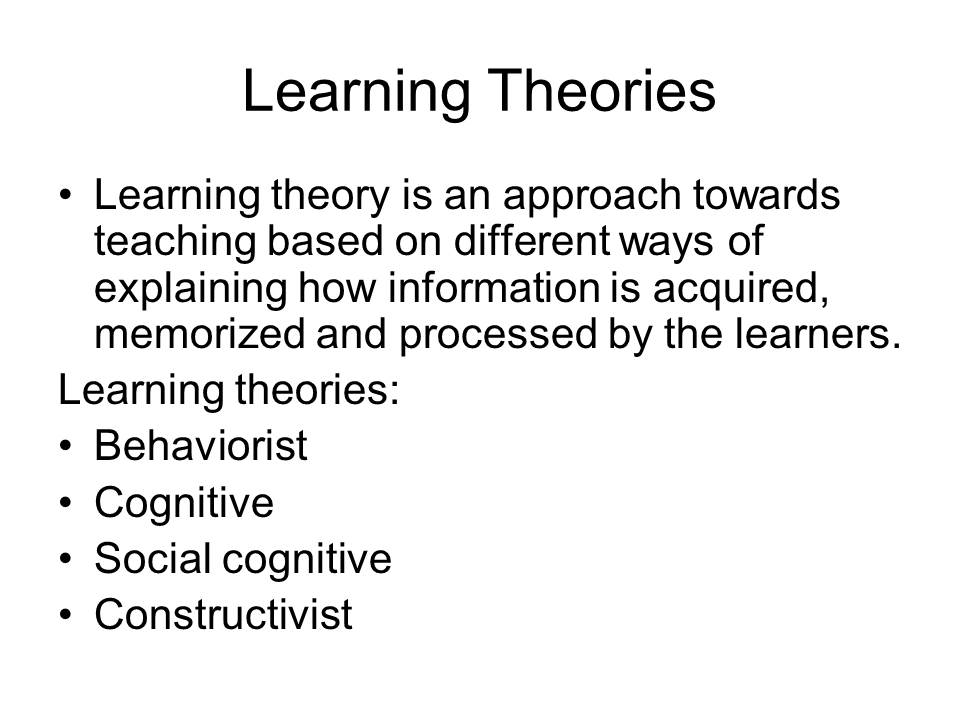
Behaviorist theories
Behaviorism views the process of learning as the changes in the students’ behavior that can be observed and evaluated. Behaviorist theories rely on conditioning:
- Learning process consists of targets which are better achieved in certain conditions;
- To optimize learning a system of rewards is used;
- The learners who are successful at completing a task are rewarded.
Behaviorist learning theories have clear goals for each assignment and are focused on the development of a behavior in the learners. Employing behaviorist learning theories during an actual lesson a teacher needs to pay attention to physical environment in the class, presence of distractions, attention focus, and the kinds of memory and perception stimulated by each assignment. During a lesson based on behaviorist approach the teacher and students interact through a number of conditioned and unconditioned stimuli and responses.
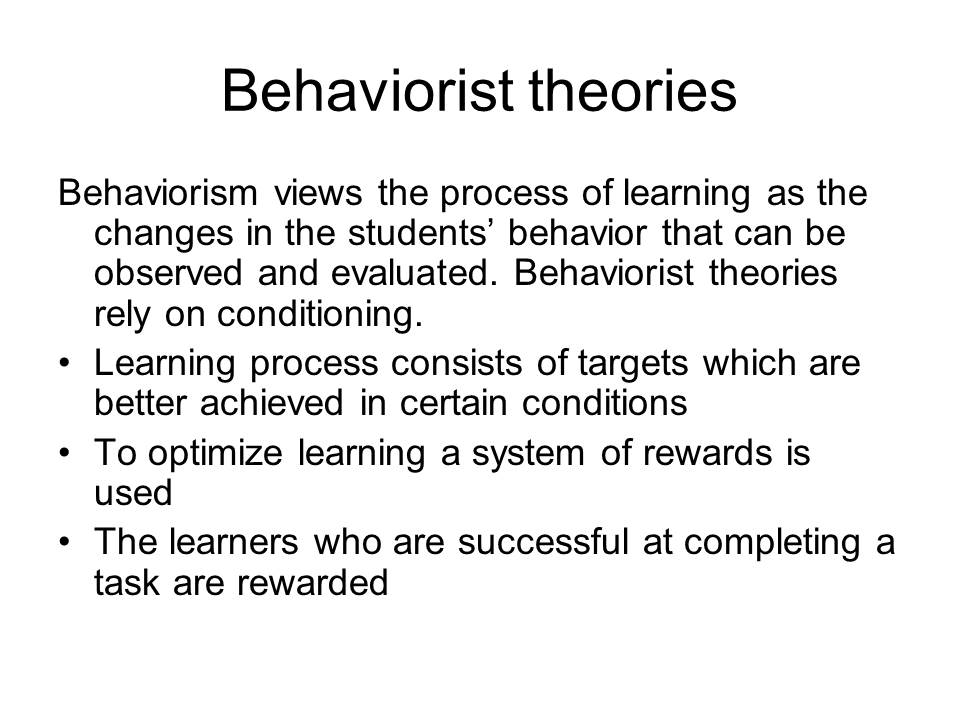
Behaviorist Lesson Example
- Storytelling or reading (teacher delivers a story about a certain action, for example, making a cake)
- Division of the story into parts (stages of making a cake)
- Presentation of cards demonstrating each of the stages for every learner
- Request to hold up the appropriate card when a teacher describes an action
In each of the stages of the lesson the teacher is to monitor the behavioral conditions for the learners. For example, when the story of delivered, the students are to employ audio perception, and when the cards are demonstrated – visual memory. It is important to get rid of distractions during the lesson, sit the children in a way so they only face the teacher. At the stage when children’s response is required, the teacher is to employ praise and reward (stickers or stars) as a conditioned stimulus to encourage and engage the learners creating an experience of play. The students that receive a certain number of stars in a row will be allowed to move on to the activity of their choice.
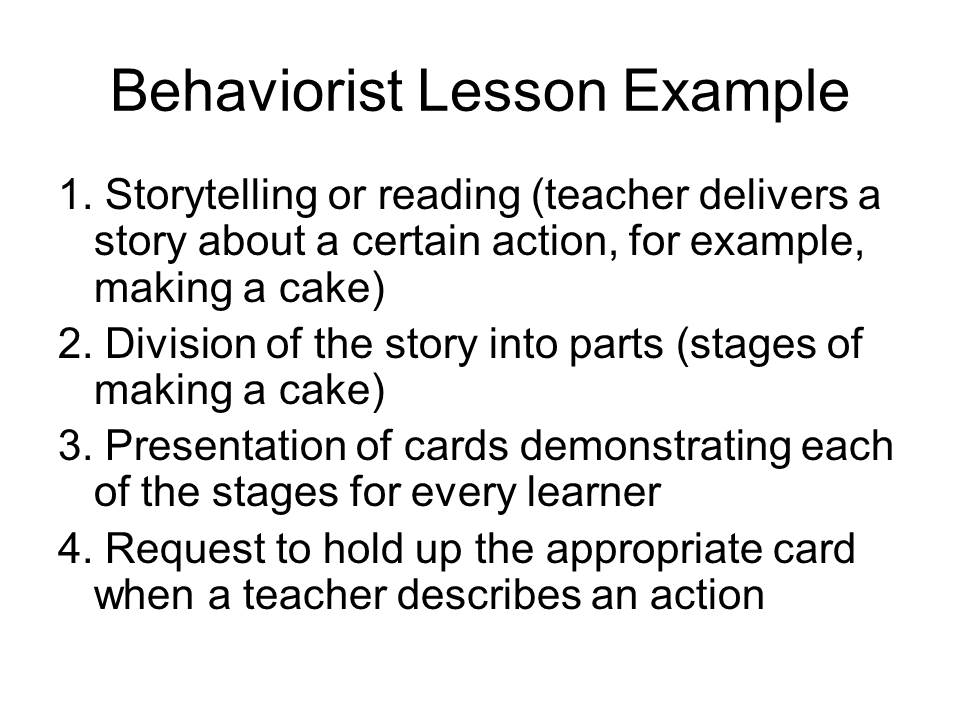
Social Cognitive Learning Theories
These theories maintain that the children should learn without being excluded for the group. This way the class is put into a state of constant collaboration between students.
- Learning based on experiences of others;
- Importance of visual contact between all of the learners;
- Children use each other’s success or failure to evaluate their own task comprehension;
- Learning happens through the observation of the performance of others and automatic comparison.
Social cognitive learning engages children into the activities such as observation, analysis and evaluation. This way, social cognitive learning transfers the attention of students from the teacher to their peers. The tasks within such learning are mainly repetitive – each of the learners is asked to perform an action demonstrated by the model student and other learners.
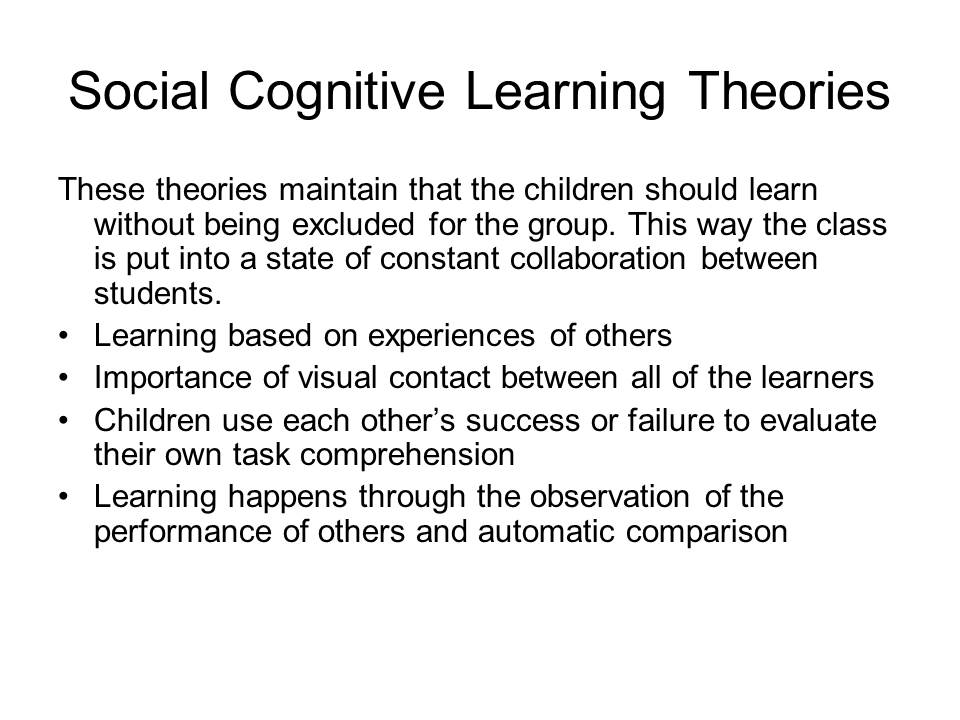
Social Cognitive Lesson Example
- A presentation of a story;
- Division of the story into pieces (just like in behaviorist lesson);
- Presentation of each learner with several cards and demonstration of their correct sequence;
- Asking a model student to hold up the first card of the sequence the teacher then calls out the names of other learners asking them to show the same card;
- Model student is asked to describe the action in the card, and then others are requested to do the same (this has to be done with every card of the sequence);
- Quick test – the students are given little time to pick the cards correctly as the teacher names them.
The students making correct choices are rewarded. In the end of the lesson the teacher may evaluate the individual learning of each child by asking them to arrange the cards in the right order and hand them to the teacher. This strategy is applicable to any game and can be used for relay races or contests.
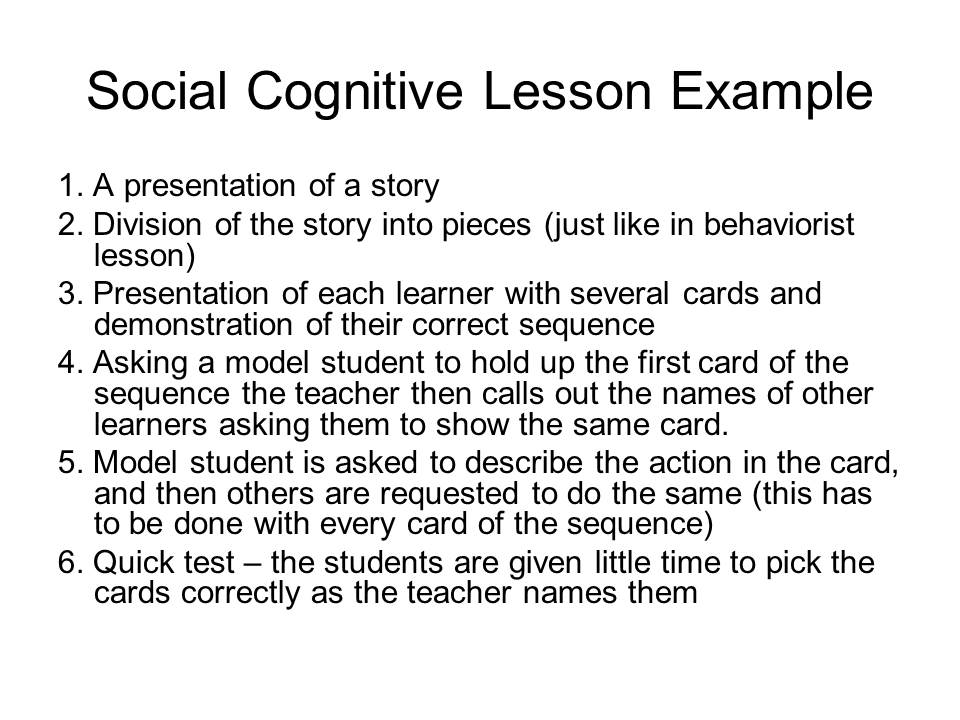
Cognitive Theories
The base of these theories is cognitive pursuit.
Distinct features:
- Discussion;
- Expression of personal opinion;
- Rationalization;
- Explanation based on one’s own impressions or ideas;
- Making conclusions.
The most important purpose of cognitive approach towards learning is to stimulate the use of critical thinking and analysis. Conducting cognitive learning activities a teacher is to engage the learners into discussions, debates, or group analysis where different students would express their points of view considering a suggested topic and then discuss all of the versions. Cognitive theories employ the application of all the senses of the learners which makes the acquisition and processing of information all-consuming and very effective.
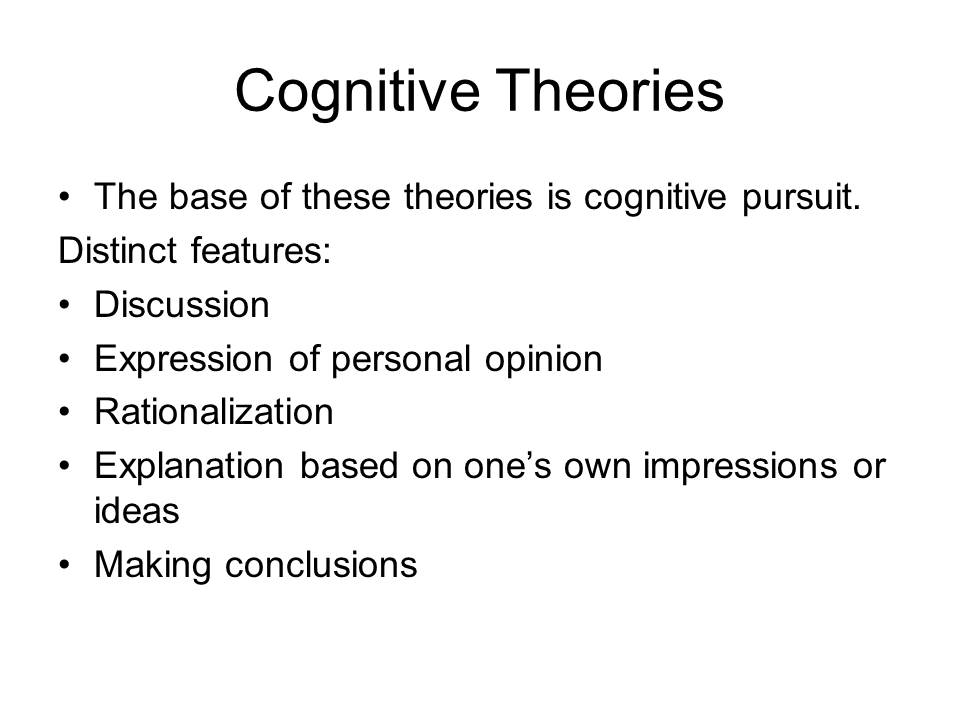
Cognitive Lesson Example
- Cognitive lesson begins with the introduction of a subject and its discussion;
- The children are directed and stimulated by the educator’s questions (if the topic is baking a cake, the teacher first asks about favorite cakes of the children, where the cakes come from, whether their parents make those cakes and how, according to the children’s ideas, the cakes are made);
- The teacher writes down versions;
- Learners vote for the most reliable ones;
- Then the story about cake making is delivered, demonstrated by means of cards and discussed;
- In the end the children are asked to re-create the sequence of actions presented in the story.
Cognitive approach stimulates children to listen to the educator and one another, analyze ideas of others, share personal opinions, visually perceive the pictures, and memorize them. To add one more way of perception a teacher might use models of cakes, and toy ingredients to reenact the process of making a cake.
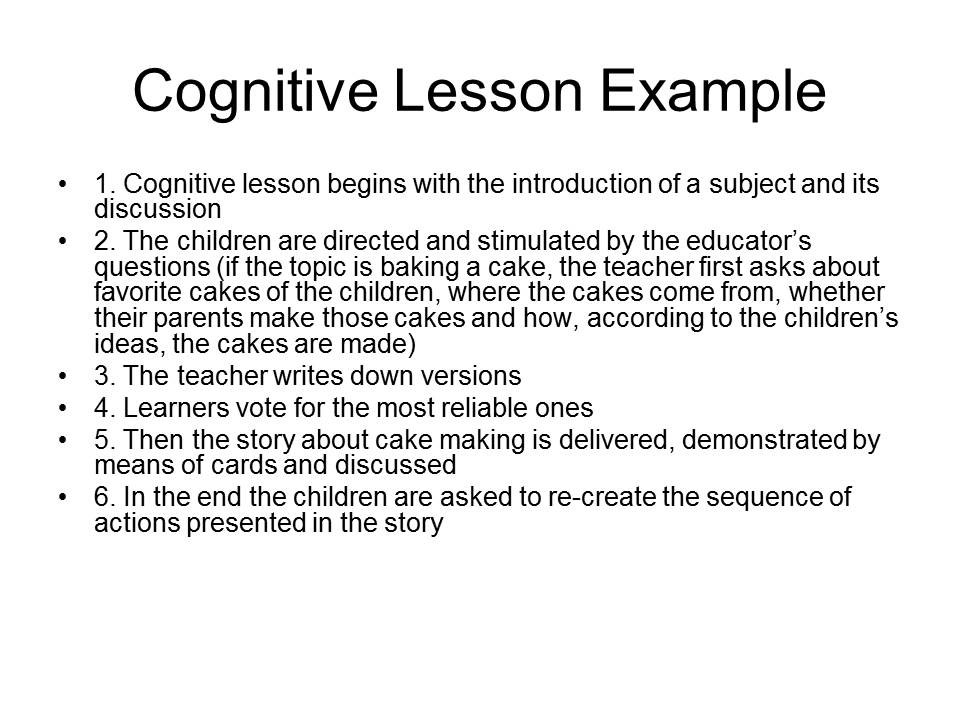
Constructivist Learning Theories
Main principle: Authentic experience, relevant environment, active learning through perception.
Constructive activities include:
- Excursions;
- Field-trips;
- Investigations;
- Scavenger hunt.
During the constructivist activities the learners are put right into the environment or action they are expected to study. This method works well because it leaves the learners filled with colorful impressions, it ties up theory and practice and provides an excellent demonstration of the academic material.
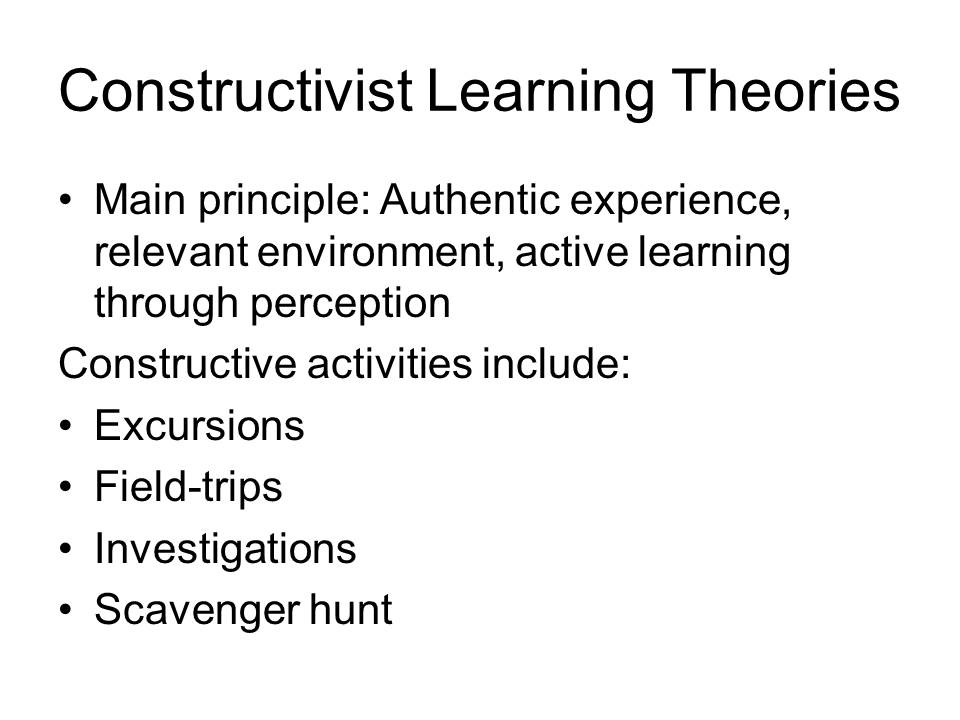
Constructivist Lesson Example
In the case with cake baking process as a subject, it would be appropriate to take children to a field trip to bakery.
- Children observe various stages of cake making process;
- The teacher encourages active learning asking questions about the process;
- After the trip the educator engages the learners into a discussion of new experience and impressions;
- As a follow-up the children might be asked to present drawings of various stages of cake baking they enjoyed watching the most.
During such lesson a teacher acts as an observer, yet his or her role is to monitor the perception of students and direct them emphasizing various information by means of asking questions.
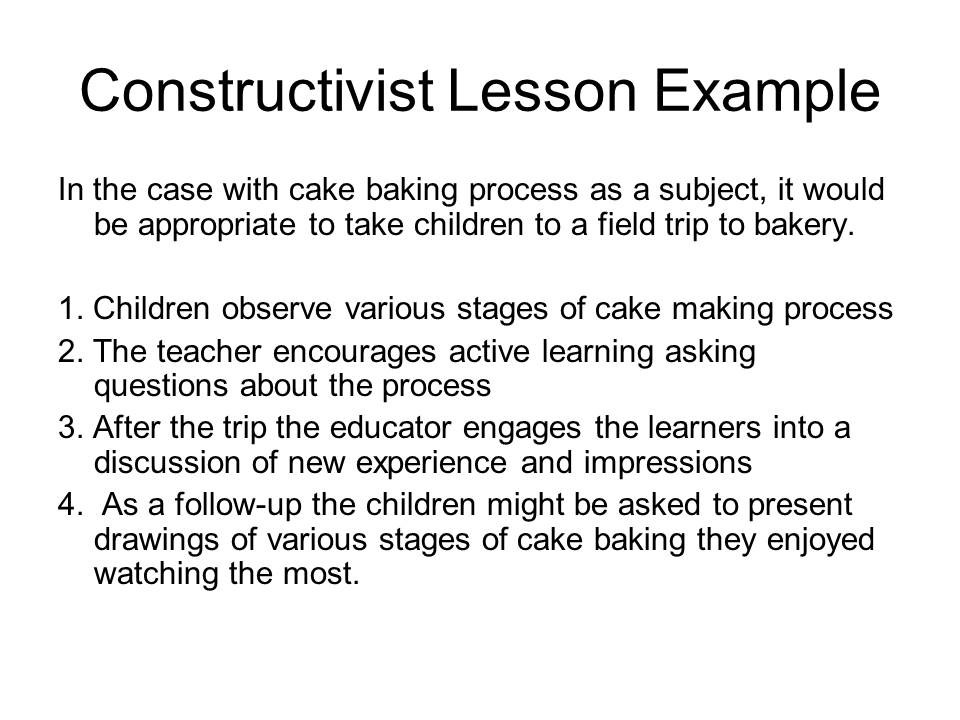
CCLC centers
CCLC is a USA-based organization focused on providing child-care for companies.
Ideally, the proportion of various kinds of knowledge within a school curriculum should look like this (Tenysson, 2010):
Educational Goals
- Declarative knowledge (verbal and visual information);
- Procedural knowledge (intellectial skills);
- Contextual knowledge (contextual skills);
- Differentiation/Interation (contextual skills);
- Construction (creativity).
This is the proportion child care center professionals of CCLC are trying to follow. The amount of tasks based on visual and verbal information only is limited to the minimum while the tasks designed to develop contextual skills and creativity are prevalent.
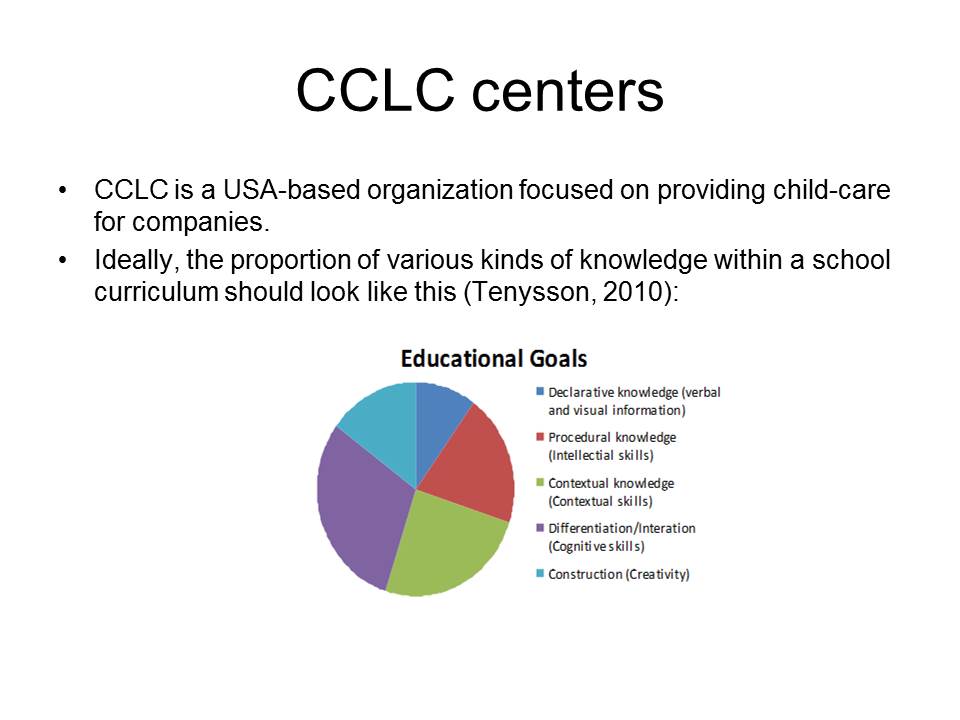
Reference List
McNeele, R. S. (2007). Learning theories in the early childhood classroom environment. Web.
Tenysson, R. D. (2010). Historical reflection on learning theories and instructional design. Contemporary Educational Technology, 1(1), 1-16.